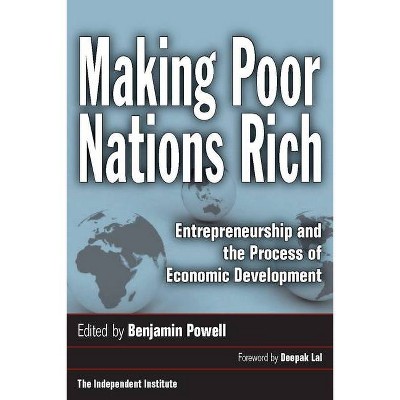Making Poor Nations Rich - by Benjamin Powell (Paperback)

Similar Products
Products of same category from the store
AllProduct info
<p/><br></br><p><b> About the Book </b></p></br></br><i>Making Poor Nations Rich</i> illustrates the importance of institutions that support economic freedom and private property rights for promoting the form of productive entrepreneurship that leads to sustained increases in countries' standard of living.<p/><br></br><p><b> Book Synopsis </b></p></br></br><i>Making Poor Nations Rich</i> illustrates the importance of institutions that support economic freedom and private property rights for promoting the form of productive entrepreneurship that leads to sustained increases in countries' standard of living.<p/><br></br><p><b> Review Quotes </b></p></br></br><br><i>Making Poor Nations Rich</i> is a serious attempt to further develop the theory of entrepreneurship. Fourteen chapters of the book cover the most important issues of our time: wealth and poverty of nations, the role of entrepreneurship in economic and human development, economic performance of transitional economies with the stories of both winners and losers.--Yuri Maltsev "Carthage College"<br><br>The book concludes with encouraging success stories from nations in Asia (China, India), Europe (Ireland), and even Africa (Botswana), whose economic achievement illustrates Powell's belief that encouraging small-business entrepreneurs is the best way to achieve and maintain general affluence... The writing here is vivid and intelligent. Futurists will be particularly interested in the essays by James A. Dorn on China's key achievements and remaining economic needs, as well as the assessment of India's prospects for attaining world prominence in trade and culture by Parth J. Shah and Renuka Sane.--<i>The Futurist</i><br><br>This book is a bold quarterback sneak directly into a line of argument in economic development studies that has long been ignored, trivialized or considered impossible to measure. It emphasizes the critical role of entrepreneurship vigorously undertaken in a friendly institutional setting, moving from theoretical analyses to individual and national case studies in countries and regions worldwide.--William Ratliff, Hoover Institution<br><br>While previous literature on entrepreneurship focused on how to construct new government programs to promote entrepreneurship, this book turns that theory on its head. This book shows how policies that limit government's scope of action are necessary to promote entrepreneurship. It is a refreshing change, and much more in line with the new and upcoming theories in this area than any previous works on state entrepreneurship policy.--Russell S. Sobel<br><p/><br></br><p><b> About the Author </b></p></br></br>Benjamin Powell is Director of the Center on Entrepreneurial Innovation at the Independent Institute and Assistant Professor of Economics at San Jose State University.
Price History
Price Archive shows prices from various stores, lets you see history and find the cheapest. There is no actual sale on the website. For all support, inquiry and suggestion messages communication@pricearchive.us




















